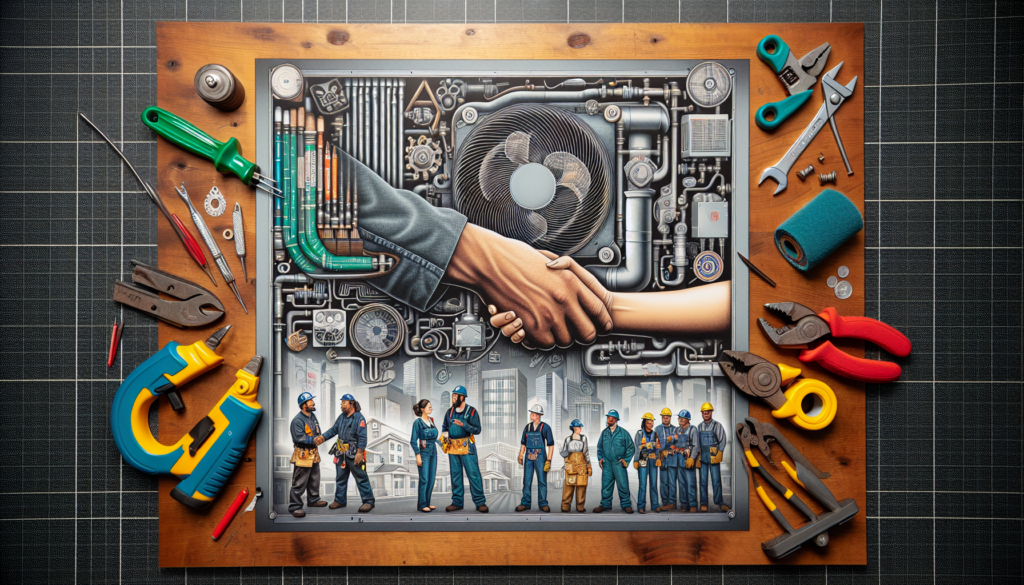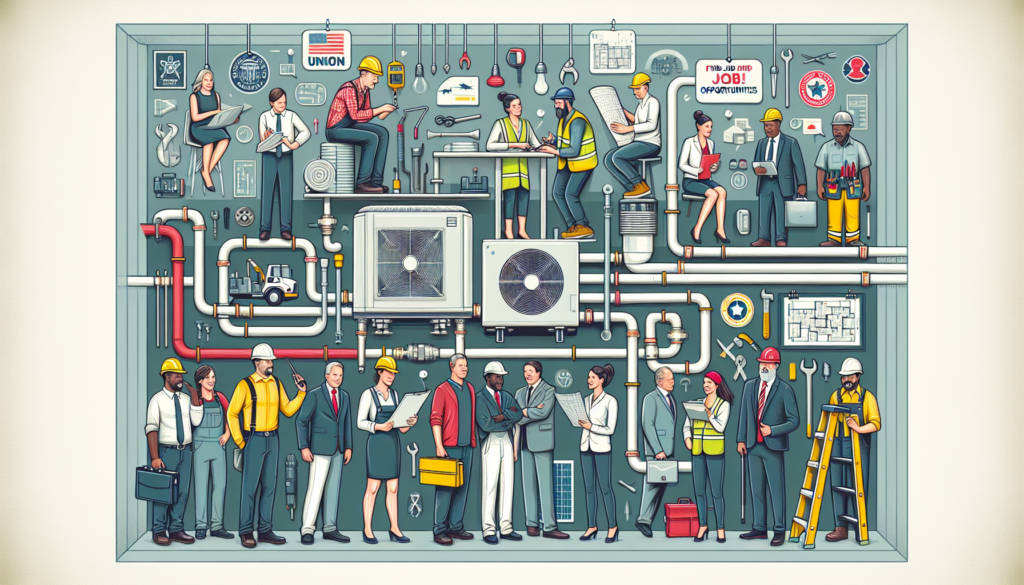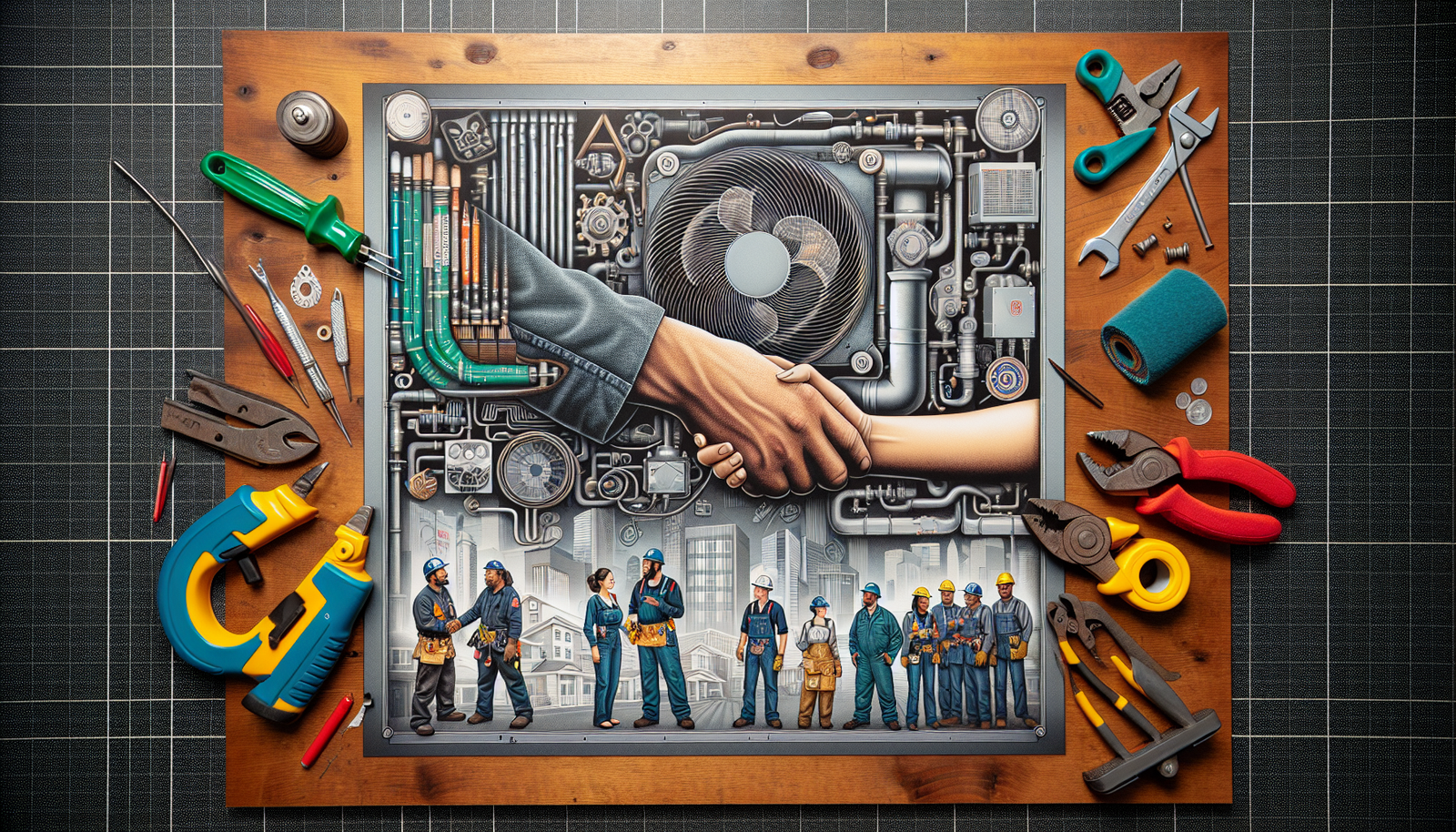Are you someone who enjoys working with your hands and has a knack for fixing things? If so, then you may be interested in exploring the world of Union HVAC jobs. In the heating and cooling industry, there are countless opportunities for skilled individuals to join a union and make a meaningful impact on the comfort and well-being of others. Whether you’re a recent graduate looking for a stable career or someone considering a change, this article will guide you through the various paths and advantages of pursuing a Union HVAC job. From steady employment to competitive wages and extensive training, the possibilities within this thriving industry are endless. So, let’s dive into the world of Union HVAC jobs and uncover the exciting opportunities that await you.
Benefits of Union HVAC Jobs
Higher wages and benefits
Working in a union HVAC job comes with the advantage of higher wages and benefits compared to non-union positions. Unions negotiate collectively on behalf of their members, ensuring that workers receive fair compensation for their skills and experience. This can include higher hourly rates, overtime pay, and comprehensive health insurance coverage. Additionally, union contracts often include other benefits such as retirement plans, paid time off, and professional development opportunities.
Job security and stability
Union HVAC jobs offer a sense of job security and stability. Unions work tirelessly to protect the rights of their members and ensure that they are treated fairly by employers. Union contracts typically include clauses that protect workers from unjust termination or unfair treatment, providing a safety net in case of unforeseen circumstances. With the backing of the union, employees can have peace of mind knowing that their jobs are secure and they have representation in the event of any disputes.
Training and apprenticeship programs
Union HVAC jobs provide access to comprehensive training and apprenticeship programs. Unions invest in the development of their members, offering a structured path for individuals interested in entering the HVAC industry. These programs allow aspiring technicians to learn from experienced professionals, gaining hands-on experience and essential skills. The structured nature of union training programs ensures that workers receive a well-rounded education, increasing their employability and potential for career growth within the industry.
Requirements for Union HVAC Jobs
Education and certification
To pursue a career in union HVAC jobs, certain education and certification requirements must be met. While the specifics may vary depending on the local union and the state’s regulations, a high school diploma or equivalent is typically the minimum educational requirement. Some unions may also require additional technical coursework or completion of a certified HVAC program. Additionally, obtaining certification from organizations such as the Environmental Protection Agency (EPA) is often necessary to handle refrigerants legally.
Physical fitness and mechanical skills
Union HVAC jobs require individuals to possess a certain level of physical fitness and mechanical skills. The nature of the job can involve physically demanding tasks such as lifting heavy equipment, climbing ladders, and working in tight spaces. It is important for HVAC technicians to have the endurance and strength to perform these duties safely and effectively. Mechanical skills are also essential as HVAC technicians need to be able to troubleshoot and repair complex heating and cooling systems.
Union membership
To work in a union HVAC job, individuals must become members of the respective union. This involves paying union dues and abiding by the union’s rules and regulations. Union membership offers numerous benefits, including collective bargaining power, access to training programs, legal representation, and job security. It is important for individuals interested in union HVAC jobs to research and understand the requirements and obligations of union membership before pursuing a career in this field.

Finding Union HVAC Job Opportunities
Contacting local unions
One of the most effective ways to find union HVAC job opportunities is by contacting local unions directly. Local unions often have dedicated representatives who can provide information about current job openings, apprenticeship programs, and membership requirements. By reaching out to these unions, individuals can gain valuable insights into the job market, requirements, and any upcoming opportunities. It is advisable to prepare a resume and be ready to discuss one’s qualifications and interest in the HVAC field when contacting local unions.
Online job boards
Another avenue for finding union HVAC job opportunities is through online job boards. Many unions and HVAC companies advertise their vacancies on these platforms. Individuals interested in union HVAC jobs can regularly check these job boards for relevant openings. It is important to tailor the resume and cover letter to highlight relevant skills and experience in the HVAC industry when applying through online job boards. Additionally, setting up job alerts on these platforms can help individuals stay updated on new job postings.
Networking and referrals
Networking plays a vital role in finding union HVAC job opportunities. Building relationships with professionals already working in the industry can provide valuable insights and potential job leads. Attending industry events, trade shows, and joining professional organizations can help individuals connect with HVAC professionals and create networking opportunities. Referrals from trusted contacts can also be an effective way to learn about job openings that may not be advertised publicly. Actively engaging in networking and building relationships within the HVAC community can increase the chances of finding union job opportunities.
Union HVAC Job Application Process
Submitting a resume and cover letter
When applying for union HVAC jobs, it is important to submit a professional and well-written resume and cover letter. These documents serve as the first impression and opportunity to showcase one’s qualifications and experience in the HVAC field. The resume should highlight relevant skills, certifications, and previous work experience. The cover letter should be personalized and tailored to the specific job, expressing genuine interest in the position and the union. Proofreading for any errors and ensuring that the documents are properly formatted are crucial to make a positive impression.
Completing an application form
In addition to submitting a resume and cover letter, union HVAC job applicants may be required to complete an application form. These forms typically gather essential information about the applicant’s education, work history, certifications, and references. It is important to provide accurate and complete information on the application form and ensure that it is filled out legibly. Taking the time to review the form and double-checking for any errors or missing information will help to present a professional and thorough application.
Interviewing and skills assessment
As part of the union HVAC job application process, candidates may be invited to an interview and skills assessment. The interview allows the employer or union representative to assess an applicant’s qualifications, technical knowledge, and fit within the organization. It is important to prepare for the interview by researching common interview questions, reviewing HVAC principles, and practicing responses to potential questions. Additionally, candidates may be required to undergo a skills assessment to demonstrate their competency in performing HVAC tasks. Taking the time to prepare and showcasing one’s skills can greatly enhance the chances of securing a union HVAC job.

Working as a Union HVAC Technician
Daily responsibilities
As a union HVAC technician, your daily responsibilities may vary depending on the specific job and the needs of the clients. However, common tasks include installing, repairing, and maintaining heating, ventilation, air conditioning, and refrigeration systems. This can involve troubleshooting issues, replacing faulty parts, conducting regular maintenance checks, and ensuring systems are running efficiently. Union HVAC technicians may also work with clients to provide recommendations on energy-efficient systems and solutions to enhance comfort levels within buildings.
Working conditions
Union HVAC technicians may work in a variety of settings and conditions. This can range from residential homes to commercial buildings, industrial facilities, and even outdoor environments. HVAC technicians often work indoors, but there may be instances where they need to work outside, especially during the installation or maintenance of HVAC systems on rooftops or in open areas. The job can be physically demanding, requiring technicians to carry heavy equipment, work in confined spaces, and navigate through challenging environments. However, the satisfaction of solving complex problems and ensuring the comfort of clients can outweigh the physical demands.
Career progression opportunities
Working as a union HVAC technician provides opportunities for career progression and growth. Union members often have access to ongoing training and professional development programs that help expand their skillset and knowledge within the HVAC industry. This allows technicians to specialize in specific areas, such as commercial refrigeration or energy-efficient systems, and advance their careers. Additionally, union membership offers individuals the chance to become involved in union leadership roles or mentoring programs, providing avenues for personal and professional growth within the HVAC field.
Pros and Cons of Union HVAC Jobs
Pros: job security and stability, competitive wages and benefits, career advancement opportunities
One of the major advantages of union HVAC jobs is the job security and stability they offer. Unionized workers are protected by collective bargaining agreements that outline their rights and provide a framework for fair treatment. This protection ensures that union HVAC technicians have a higher level of job security compared to non-union workers.
Union HVAC jobs also typically come with competitive wages and benefits. Unions negotiate on behalf of their members to ensure that they receive fair compensation for their skills and experience. This can include higher hourly rates, overtime pay, health insurance, retirement plans, and other valuable benefits.
Furthermore, union HVAC jobs provide numerous opportunities for career advancement. Union members often have access to educational programs and professional development training that allow them to expand their skillset and move up within the industry. Taking advantage of these opportunities can open doors to higher-paying positions and increased job satisfaction.
Cons: strict regulations and procedures, limited flexibility, potential union conflict
While there are many benefits to union HVAC jobs, there are also some potential drawbacks to consider. Unionized workplaces often have strict regulations and procedures that must be followed, which can sometimes be seen as limiting individual freedom and flexibility. These regulations are put in place to protect workers’ rights and ensure fair treatment, but they can sometimes be perceived as restrictive.
Another potential con is the potential for conflict within the union. While unions exist to advocate for workers’ rights, differing opinions and conflicts of interest can arise within the union itself. This can lead to disputes and disagreements that may need to be resolved through internal processes, potentially causing tensions within the workplace.
Overall, evaluating the pros and cons of union HVAC jobs allows individuals to make an informed decision based on their priorities and personal circumstances.
Union HVAC Jobs vs Non-Union HVAC Jobs
Wage and benefit differences
One of the key differences between union HVAC jobs and non-union HVAC jobs is the difference in wages and benefits. Union HVAC jobs generally offer higher wages and more comprehensive benefits compared to their non-union counterparts. Unions negotiate on behalf of their members to secure fair wages, overtime pay, health insurance, retirement plans, and other valuable benefits. Non-union HVAC jobs may not have the same level of collective bargaining power, resulting in potentially lower wages and fewer benefits.
Job security and stability
Union HVAC jobs typically provide a higher level of job security and stability compared to non-union jobs. Unions work to protect the rights of their members and ensure that they are treated fairly by employers. Union contracts often include clauses that protect workers from unjust termination or unfair treatment. This provides a safety net for union HVAC technicians, offering peace of mind and a higher degree of job security.
Training and advancement opportunities
Union HVAC jobs offer structured training and apprenticeship programs that can enhance career opportunities. Unions invest in the development of their members, providing access to comprehensive training and educational programs. This allows individuals working in union HVAC jobs to gain valuable skills and knowledge, increasing their employability and potential for career advancement within the industry. Non-union HVAC jobs may not offer the same level of formalized training and advancement opportunities.
Union HVAC Jobs for Veterans
Special programs and initiatives
Union HVAC jobs often provide special programs and initiatives for veterans. Many unions have established partnerships with organizations that support veterans’ transition to civilian careers, offering specialized training programs, job placement assistance, and mentoring opportunities. These programs recognize the valuable skills and experience that veterans bring to the HVAC industry and provide a supportive pathway for them to enter union HVAC jobs.
Transferable skills and experience
The skills and experience gained during military service can be highly transferable to union HVAC jobs. Veterans often possess strong problem-solving skills, attention to detail, and the ability to work well under pressure – qualities that are highly valued in the HVAC industry. Additionally, veterans may have specialized training in areas such as mechanical systems, electrical systems, or HVAC technology, making them well-suited for a career in heating and cooling.
Supportive community and networking opportunities
Union HVAC jobs provide veterans with a supportive community and networking opportunities. By joining a union, veterans become part of a larger network of professionals who share similar experiences and a commitment to their craft. This sense of camaraderie can help veterans transition smoothly into the HVAC industry and provide valuable support throughout their careers. Networking within the union can also lead to connections with employers, mentors, and fellow HVAC technicians, opening doors to new job opportunities and professional growth.
Top Union HVAC Employers
National unionized HVAC companies
Several national HVAC companies have strong union representation and can provide excellent employment opportunities for union HVAC technicians. These companies often have a wide range of projects and contracts, offering job stability and career growth potential. Examples of such companies include Johnson Controls, Trane Technologies, and Carrier Corporation. Researching and reaching out to these companies directly can uncover potential job opportunities for individuals seeking union HVAC employment.
Major metropolitan areas with strong union presence
Many major metropolitan areas have a strong union presence within the HVAC industry, providing numerous job opportunities for union HVAC technicians. Cities such as New York, Chicago, Los Angeles, and Philadelphia often have a high demand for HVAC services in residential, commercial, and industrial sectors. These areas also attract large construction projects and require skilled union HVAC technicians to meet the heating and cooling needs of the buildings. Exploring job opportunities in these areas can lead to steady employment and advancement within the HVAC field.
Government and institutional facilities
Government and institutional facilities often have a significant need for union HVAC technicians. These facilities include schools, hospitals, military bases, and government buildings. Unionized HVAC technicians are sought after by these entities due to the high level of regulation and expertise required in maintaining these essential systems. Working in government or institutional facilities provides stable employment, competitive wages, and opportunities for career advancement within the union.
Future Outlook for Union HVAC Jobs
Growing demand for HVAC services
The future outlook for union HVAC jobs remains positive due to the growing demand for heating and cooling services. As the population continues to increase, so does the need for residential and commercial buildings, creating a constant need for HVAC installation and maintenance. Additionally, the increasing importance of energy efficiency and sustainability in building design and operation further contributes to the demand for trained HVAC technicians. Union HVAC jobs are expected to remain in high demand to meet these evolving industry needs.
Technological advancements in the industry
Rapid technological advancements in the HVAC industry are transforming the way HVAC systems are designed and operated. The integration of smart technology, energy management systems, and renewable energy sources requires skilled technicians who can adapt to these changing technologies. Union HVAC technicians will need to stay updated on the latest industry trends and undergo continuous training to effectively service and repair these advanced systems. The ability to adapt and embrace technological advancements will be crucial for future success in union HVAC jobs.
Increasing focus on energy efficiency and sustainability
There is a growing emphasis on energy efficiency and sustainability in building practices and regulations. This trend presents both opportunities and challenges for union HVAC jobs. Union HVAC technicians play a critical role in promoting and implementing energy-efficient heating and cooling systems. By utilizing advanced technologies and techniques, union HVAC technicians can help reduce energy consumption and minimize the environmental impact of HVAC systems. The increasing focus on energy efficiency and sustainability creates new avenues for growth within the industry, ensuring a promising future for union HVAC jobs.
In conclusion, union HVAC jobs offer numerous benefits, including higher wages and benefits, job security, and access to training and apprenticeship programs. To pursue a career in union HVAC jobs, individuals must meet education and certification requirements, possess physical fitness and mechanical skills, and become members of the respective union. Finding union HVAC job opportunities involves contacting local unions, utilizing online job boards, and networking. The application process typically includes submitting a resume and cover letter, completing an application form, and participating in an interview and skills assessment. Working as a union HVAC technician entails daily responsibilities such as installing and repairing HVAC systems, working in various conditions, and provides opportunities for career advancement. Understanding the pros and cons of union HVAC jobs, as well as the differences between union and non-union positions, can assist individuals in making informed decisions about their career paths. Union HVAC jobs also offer special programs and initiatives for veterans, recognizing their transferable skills and providing a supportive community. Top union HVAC employers include national companies, major metropolitan areas, and government and institutional facilities. The future outlook for union HVAC jobs is positive due to the growing demand for HVAC services, technological advancements in the industry, and the increasing focus on energy efficiency and sustainability.

